florida

Black motorists in Florida are twice more likely to be shot by police after being pulled over for a traffic violation than white motorists in Florida, reports the Tampa Bay Times in an online interactive, “If You’re Black.”
This statistic is part of a new investigative study by the paper of every police shooting that occurred in Florida from 2009-2014. The newspaper gathered data from autopsies, news articles, police reports, and subsequent lawsuits.
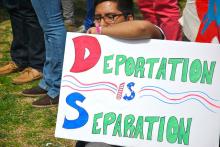
A recent study by the Public Religion Research Institute reveals there aren’t any states in the U.S. in which 50 percent or more of its residents support deportation as adequate reform of the immigration system. Even in California, Texas, and Florida, states that respectively have the highest, second-highest, and third-highest number of undocumented immigrants in the country, this holds true.

Twenty-seven Jewish community centers in 17 states reported receiving false telephone bomb threats on Jan. 18, prompting evacuations and an FBI probe into the second wave of hoax attacks to target American Jewish facilities this month.
The JCC Association of North America, a network of health and education centers, said the threatened organizations were working with police and many had resumed operations, after no bombs were found nor injuries reported, as was the case after the earlier series of threats on Jan. 9.

At least 16 Jewish community centers received bomb threats on Jan. 9, in an apparent attempt to rattle American Jews, who have seen a spike in anti-Semitism incidents in the past year.
The threats — some by live callers, some by robocall — were made to JCCs in Florida, Maryland, New Jersey, Tennessee, South Carolina, and at least four other states.

Let us not forget the impact that D.W. Griffith’s The Birth of a Nation had on America when it was released in 1915. An adaptation of the novel The Clansman: A Historical Romance of the Ku Klux Klan, there’s little doubt in my mind that the film’s racist depictions of African Americans and affirming depictions of Klansmen formed and hardened the discriminatory beliefs of many white people in the U.S., making them further believe that black people were undeserving of fairness, respect, and freedom. The Birth of a Nation is a prime example of why we need new stories, told from the perspective of identities that are generally ignored and denigrated.
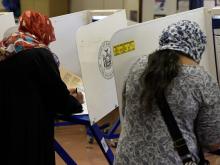
“The picture is mixed,” said Besheer Mohamed, a senior researcher at the Pew Research Center who specializes in religion.
“On the one hand, its seems clear that Muslims are a pretty small part of the population. On the other hand, they are concentrated in some states and metro areas that might increase their voting powers in those specific areas.”
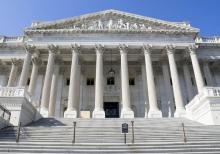
The dismantling of the Voting Rights Act of 1965 by the Supreme Court and conservative state elected officials may be a major reason behind Donald Trump's 2016 U.S. presidential election win, reports ThinkProgress. This was the nation’s first presidential election since the Voting Rights Act's implementation 50 years ago in which the act didn’t provide full protection to voters of color.

“You are in a year of greatness. You are in a year of restoration,” White preached to a group of some 100 worshippers, almost all of them African-Americans. They had gathered in a large, windowless room at Faith Assembly Christian Center, a simple building in a predominantly black neighborhood of Durham.
Asked afterward about her ties with the president-elect, she declined to be interviewed “out of respect for the church.”
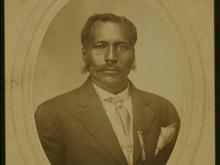
Black faith leaders and social justice advocates are commemorating the lynching of Anthony Crawford, a man who owned 427 acres in Abbeville, S.C., when he was killed on Oct. 21, 1916.
He had been jailed after a dispute with a white store owner over the price of cottonseed. He was released, but was abducted by a large mob of white men and lynched, his body riddled with bullets.

Singer and songwriter Sia recently released a stunning music video for her song “The Greatest,” featuring Kendrick Lamar, that appears to be a tribute to the victims of the Pulse nightclub shooting in Orlando, Fla. in June.
In the video, dancer Maddie Ziegler leads a group of 49 dancers in an energetic dance routine, 49 also being the number of people killed in the shooting at the gay nightclub.

The LGBTQ community continues to fight to be recognizably human, and attacks like the one here in Orlando remind us why that fight is so important and still so necessary.
At the vigil downtown on June 13, an evangelical Hispanic preacher spoke. He said, “Not all evangelicals hate you. Some of us love you and we welcome you in our congregations!” And when he prayed, many prayed with him.
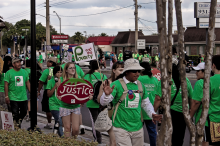
The boycott stems from Wendy’s refusal to CIW’s Fair Food Program, a workplace-monitoring program that the group designed to prevent worker abuse and exploitation, according to the Houston Chronicle.
Wendy’s has moved some operations out of Florida — where tomato growers had begun implementing the Fair Food Program — to Mexico, where worker abuse in the industry has been widely documented.

Florida is a target state for traffickers, with the Tampa Bay area as a top destination for this monstrous activity. Tampa Bay has a lethal combination of tourism, world famous beaches, hospitality and agricultural industries, sports arenas, a military base, international seaports and airports, as well as a destination spot for one of thelargest adult entertainment industries in the nation. This combination attracts all forms of human trafficking which has become a larger money maker than selling drugs, as the human "product" can be used and re-used over and over again.

The Supreme Court’s decision to sit out the legal battle over same-sex marriage will — for now, at least — leave the future of laws prohibiting gays and lesbians from marrying in the hands of lower state and federal court judges. But it also almost certainly means the couples challenging those laws are more likely to win in the end.
The court said Oct. 6 that it would not hear appeals from five states whose same-sex marriage bans had been invalidated by lower federal courts. The decision, issued without explanation, will likely lead to recognition of gay marriages in 11 more states. It also allows an avalanche of legal challenges to the remaining bans to keep going forward in state and federal courts, where gay and lesbian couples have overwhelmingly prevailed.
The court’s decision leaves unchanged 20 state laws blocking same-sex unions. Each is already under legal attack, facing challenges in state or federal court, and sometimes both. Challenges to marriage bans already have reached a handful of state appeals courts and the federal appeals courts for the 5th, 6th, 9th and 11th circuits.
Some of those judges had been waiting to see what the Supreme Court would do. The court’s instruction Oct 6. was: Proceed.
MARQUETTA L. GOODWINE, a computer scientist, mathematician, and community organizer, grew up on the Sea Islands off the coast of South Carolina. On July 2, 2000, Goodwine was “enstooled,” in a traditional African ceremony, as “Queen Quet,” political and spiritual leader of the Gullah/Geechee Nation that extends from coastal North Carolina to Jacksonville, Fla.
“A lot of people don’t know that we exist,” she told Sojourners. “People are unaware that there is a subgroup of the African-American community that’s an ethnic group unto itself, with nationhood status for itself.”
Queen Quet, and the Gullah/Geechee Sea Island Coalition she founded, are actively engaged in battling environmental racism and climate change. As a cultural leader of an Indigenous community, she works to preserve her people’s heritage in the land and stop corporate encroachment. As a spiritual leader of a people who practice a unique form of faith that adheres to Christian doctrine while being distinctly African, she nurtures her people’s tradition of communal prayer, song, and dance, as well as their connection to Praise Houses, the small places of worship built on plantations during slavery.
Sojourners contributing writer Onleilove Alston, lead organizer in Brooklyn for Faith in New York, a member of the PICO National Network, sat down with Queen Quet on St. Helena Island in Beaufort County, South Carolina, to learn more about the Gullah/Geechee people, their spirit, and their struggle for justice. —The Editors
THE GULLAH/GEECHEE PEOPLE are the descendants of African people that were enslaved on the Sea Islands. We are descendants of Igbo, Yoruba, Mende, Mandinka, Malinke, Gola, Ife, and other ethnic groups from the Windward Coast of Africa, as well as Angola and Madagascar.
We also have Indigenous American ancestry from the Cusabo, Yamasee, Cree, and Edistow, the original inhabitants of the land now held in the Gullah/Geechee Nation. A socio-anthropologist segregated us at one point, saying that Gullahs are on the South Carolina Sea Islands and Geechees are on the Georgia Sea Islands, but there is no difference between us. We are one people.
In 1999, I became the first Gullah/Geechee in history to speak before the United Nations. Now I am a member of the International Human Rights Association of American Minorities, an NGO with U.N. consultative status, and the International Human Rights Council (a coalition of human rights scholars and activists that works on key human rights issues).
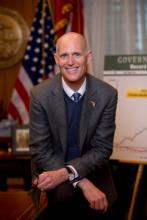
This week, Florida Gov. Rick Scott signed into law a measure widely touted as a “foreign law ban.” But proponents of such bans should not be too quick to claim victory.
This is a far cry from foreign law bans in states such as Kansas and Arizona, which demand their courts to reject foreign laws or judgments if they come from a country that does not protect rights in the identical way we do.

Florida megachurch pastor Bob Coy has resigned from his 20,000-member Calvary Chapel Fort Lauderdale congregation over a “moral failing.”
A statement on the church’s website reported the news: "On April 3, 2014, Bob Coy resigned as Senior Pastor of Calvary Chapel Fort Lauderdale, effective immediately, after confessing to a moral failing in his life which disqualifies him from continuing his leadership role at the church he has led since its founding in 1985."
A call to Coy on Sunday was not returned. But it appears extra-marital affairs may have been one reason.

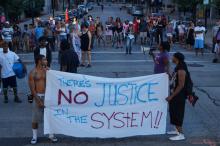
The problem is the systemic injustice inherent in Stand Your Ground laws: just feeling like you are being threatened can justify your response in “self-defense.” Under Florida self-defense laws now, someone can use even lethal force if they “reasonably believe” it is necessary to defend their lives or avoid great harm. How does a jury decide what a “reasonable person” would do under all the circumstances? Even if Dunn really believed there was a gun in the black teenagers’ car and there wasn’t one, he could still be justified in shooting into the car according to Stand Your Ground. The New York Times quoted Mary Anne Franks, an associate law professor at the University of Miami saying, “This trial is indicative of how much of a problem Stand Your Ground laws really do create … By the time you have an incident like this and ask a jury to look at the facts, it’s difficult to re-create the situation and determine the reasonableness of a defendant’s fear.” And unfortunately, the law creates an opportunity for racial factors — whether they’re conscious or not — to trump facts when even one juror who is sympathetic to a defendant’s “reasonable” fear can prevent prosecution.

Jesus, please be with Marissa Alexander today.
You know Marissa, the 32-year-old mother who fired a warning shot in the air to ward off her then-husband who was threatening to abuse her. You know that she tried to claim stand your ground and was denied by State Attorney Angela Corey who said Alexander fired her shot out of anger, not fear. You know that Corey’s office prosecuted George Zimmerman and did not block Zimmerman’s lawyers from embedding the language of the stand your ground statute in his jury’s instructions. You know that Zimmerman was declared not guilty based on that language, while Alexander was sentenced to 20 years in prison because of 10- to-20-year mandatory minimum sentencing requirements in Florida.